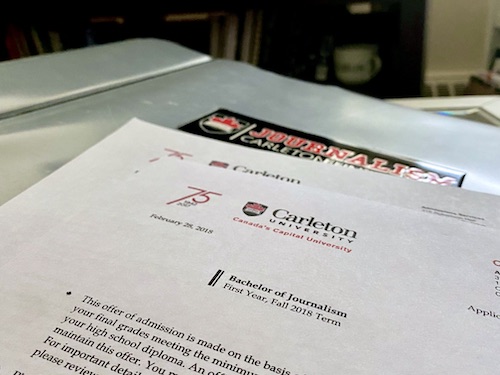
Nine things to know before accepting your offer to j-school
So, you’ve been admitted to Carleton University’s journalism school. How unfortunate.
Just kidding! I sincerely offer you my heartiest congratulations. Should you choose to accept your offer, you have an incredibly exciting, fast-paced and educational four years ahead of you. You definitely chose the right school to apply to, as no other university or college journalism program in the country has quite the same historic and prestigious reputation as Carleton’s.
But that’s just it — how do you decide if journalism school is actually for you? I’ll be honest, in my three years at Carleton, I’ve seen a fair amount of j-schoolers crash, burn and drop out — but I’ve also seen many students thrive in the program. While it’s difficult to determine which camp you’ll fall in before you actually start taking journalism courses, there are a few characteristics that tend to define those who make it through four years at Carleton j-school in one piece.
So here’s a list of nine things to know before accepting your offer to Carleton journalism!
#1: You should be the type of person who enjoys being busy.
The journalism lifestyle is not one of leisure. Following first year (which will likely be a little overwhelming, since most of you aren’t familiar with a university workload), you can get used to having one or two journalism assignments due each week, in each of your journalism classes. Granted, they’re generally relatively small assignments, but if you’re looking for a laid-back post-secondary program, Carleton journalism is not the place for you.
However, if you’re looking for a program that requires a decent amount of hard work (which will pay off, considering the program’s reputation across the country), then CU’s j-school might just be the place for you! This will prepare you well for the industry, should you pursue a career in it, as journalists can regularly expect to work more than 40 hours a week (as well as expect to clock in during evenings, extremely early mornings, weekends and holidays).
#2: There’s no such thing as a beat anymore.
If you’re looking to attend journalism school and write only one type of article, you’ve got another thing coming to you. While Carleton does have a reputation among journalism schools to be politically-leaning in terms of beats (which would make sense, since it’s located literally only 10 minutes away from Parliament), the school does offer the opportunity to explore many different avenues of journalism — and will expect you to, as well. Most newsrooms can’t really afford to have ‘beat’ reporters anymore. Sure, most journalists probably have an area of reporting expertise (particularly science, health and finance), but reporters need to be versatile enough that they can cover any kind of story, at any moment. Since Carleton is known for producing top-notch journalists, it makes sense producing students who can fit these roles remains a priority.
#3: This isn’t a degree that’ll make you a lot of money.
This truly should not come as a surprise, and if it does… well, I admire your optimism. According to Glassdoor.com, the current average salary of a journalist is around $50,000, with the highest being $91,000 and the lowest being $37,000. This isn’t terrible, but considering only very few people actually reach the apex of journalism salaries, as well as the industry’s movement towards freelancing as more and more journalists are being laid off, it’s something to think about. Depending on the type of lifestyle you wish to have following graduation, you really need to consider whether getting a journalism degree (which, at Carleton, can cost close to $34,000 if looking at tuition alone) is realistic for you. This isn’t a field for the light-hearted — journalism is for those who truly love the discipline, regardless of what it pays.
#4: You don’t need to love multimedia, but you need to be willing to work at it.
I will admit it, for quite a long time, I was disappointingly bad at multimedia journalism. I just couldn’t seem to grasp the basics of audio, video and data visualization. While the first two years of the program emphasize written journalism mostly, third year and beyond will see a serious focus on crafting students’ multimedia skills. If you’re not the type of person who performs well in front of, nor behind a camera, then that’s totally fine! You don’t need to love multimedia to be a good journalism student, but you do need to be willing to work at it, and be realistic in the fact that most news organizations now look for well-rounded individuals who not only know how to write strongly, but know how to plan, report, record and edit audio-visual works, as well.
#5: Pressure is a journalist’s middle name.
There’s a reason why, in every journalism movie, all of the main characters seem to be sweating and out of breath all the time. Those dark circles are the result of true method acting — and getting oneself into the mindset of a journalist is being stressed all the time.
Like I mentioned before, you’ll have to get used to weekly weekly deadlines second year and beyond, but you’ll also have to get used to these lovely things called newsrooms, where you’re thrust into a classroom for six hours with your classmates and expected to put together one to three stories each — individually or as a group. Don’t worry, it’s not actually that hard (and if you’re the right kind of person, you’ll probably find it pretty fun). But pressure is all part of being a journalist, and definitely part of being a journalism student.
#6: If you like scholarships, this is the program for you.
The nice thing about being at a national-renowned program, regardless of the field, is that the school is never void of scholarships to dole out to its top students. Of course, there’s the opportunity to earn up to $4,000 each year if continue to maintain an 80 per cent overall average in university (and if you finish high school with a certain average, you can learn more about entrance scholarships here).
Additionally, the School of Journalism and Communication has a huge number of scholarships they give out each year to journalism students based on grades, demonstrated interest in certain types of journalism, etc. (For example, if you manage to maintain an 85 per cent average in a given year, you’re automatically eligible for an extra $1,000 on top of your entrance scholarship — amazing!) If you’re a stickler for grades, you can reel in a decent amount of cash just doing well in school, often way more than what you’d earn through a part-time job during school.
#7: You need to be willing to wait for the exciting bits.
If you’ve ever heard a Carleton journalism student speak candidly, they’d probably say first year is both the easiest and the worst year of the program. While the school is slowly making progress in improving the two first-year journalism courses that are required to be taken by every student in the program, you don’t actually do a whole lot of hands-on reporting in your first year. The school expects you to focus more on journalism history and theory (while throwing a few reporting assignments in there here and there), as well as taking a large variety of courses so you can figure out what subject you want to minor or double-major in — as all journalism students are required to at least minor in on other field. So, if waiting until second year to do ‘real journalism’ sounds like an absolute nightmare to you, maybe consider attending another school. However, if you’re the type of person that enjoys learning the academic bits of a skills before being thrust directly into it, then Carleton journalism is probably for you!
#8: Pursuing journalism as a career requires more than just good grades.
Of course, like I said before, earning good grades can open a lot of doors for you as a student and student journalist. However, when applying for internships/jobs during and after the span of your degree, it is expected that you will have pursued some kind of publication opportunities during your time as a student to build up a little something-something called a portfolio. (If you want to see an example, allow me to shamelessly plug my own.)
Writing for the different student publications on campus, freelancing, etc. are all things that are generally expected of interns and new journalists who are looking to break into the field, and the quality of your portfolio is often a lot more important than the grades you got in certain classes. Of course getting good grades are important (especially since you’ll want to do well enough that your professors can and will attest to your abilities as a journalist by serving as references), but journalism is a degree in which you need to often make opportunity for yourself, and do a lot of work outside of the degree in order to obtain the qualifications that are required for more entry-level gigs.
#9: You need to have a certain level of empathy and people skills.
This doesn’t necessarily mean you need to be an extrovert in order to be a good journalist. In fact, introverted individuals often make the best journalists, as they tend to possess two qualities extroverts sometimes lack: listening skills and empathy. Journalism is a discipline that almost entirely revolves around working with and for members of the public, who are often disenfranchised people who are going through particularly tough times, or are representing a group of people who have been put down by society.
Interviewing — the core element of a journalist’s research — is more than just asking questions. It’s about connecting with people, and in order to do so, you need to listen, hear and understand what they’re saying, as well as possess the ability to empathize with their situation (from a journalistic distance, of course). A good journalist possess technical skills, yes, but they also possess people skills — which are arguably the most difficult to develop, if you don’t already have them.
Well, there you go, folks. My top nine things to know before you accept your offer to Carleton’s j-school. I hope I wasn’t too candid, and didn’t scare too many of you away — attending journalism school is truly a unique experience, and while others can give you advice as they see fit, whether you will enjoy it is only really a decision you can make on your own.
So, once again, congratulations to all of you who have already received their letters of admittance, and I wish you the absolute best of luck in your final decisions!
By Pascale Malenfant, Vice President (Internal)




